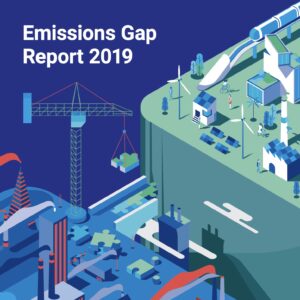
Catie Gould is Co-Chair of Bike Loud PDX and a regular BikePortland contributor. She last wrote about Portland’s housing policy.
__
Every Thursday for the last few months, I’ve been attending a small meeting in a back room of the Central Lutheran Church. Sipping tea around a table decorated with fall leaves, I took turns sharing with strangers how I feel about the climate crisis. The ten week program was put together by the Good Grief Network, which is sprouting chapters all over the world.
The support group couldn’t have come at a better time for me. In October I took a trip to Washington DC to visit my brother. At the Museum of Natural History, I was struck by a small sign. It read that the atmosphere was changing faster now than any other mass extinction event in history. I stood there for several minutes, looking at the sign then back at all the other people in the exhibit hall walking past unaware. The science of climate change was not new to me, but this little sign rocked me, and sent me into a cycle of despair. My grief manifested as a shadowy doom that followed me around. It tapped me repeatedly on the shoulder and whispered ‘“mass extinction” in my ear. For nearly a month every transportation meeting I attended left me in tears, often not waiting until I was back home. No one was acting with the urgency that was needed.
For others who might be struggling, I wanted to share some of what I learned over the last few months.
Make space for feeling
So often, we grieve alone. We read horrifying news stories on our phones throughout the day, and look back up to see the world moving on, seemingly normal. The climate crisis is hard to talk about. Despite tweeting about it constantly I still have a hard time bringing it up with my parents or at work. I signed up for the support group to create this space for myself, but pretty quickly I showed up for everyone else in the group. I wanted to hold space for them to talk about the things too hard to say normally.
Advertisement
Having this regular weekly appointment forced me to take time for myself in a way that I hadn’t prioritized before. I declined meetings and events without thinking twice. It forced me to check in about how I was feeling each week. Was I feeling resentful, angry, or nervous? The commonality in our struggles gave more validity to my own feelings, and I got more serious about caring for myself. I cooked, made time to relax, and listened to my body. I started getting regular massages to help with the stress, something that always seemed too extravagant before. Instead of feeling stalked by doom I tried to care for it like an old friend.
Optimism is not required
“It was incredibly refreshing to exist in our worst case scenarios and darkest fears together.”
People talk about hope a lot in climate conversations. I love this quote from Rebecca Solonit, “Hope is not a lottery ticket you can sit on the sofa and clutch, feeling lucky. It is an axe you break down doors with in an emergency.” The truth is I am not hopeful at all that a better future is coming. I work harder because of it – to build my own hope. But if the future of the planet is dependent on a bunch of volunteers that is a hard row to hoe. It upsets other people to hear me say that. Even in activism circles I have been told before that I am a downer, or that talking about climate change with me is depressing. Comments like that make it hard to know when it’s ok to bring it up or how, and discourages people from talking about the crisis at all.
In this group, we weren’t trying to put on a good face and reassure each other things will be okay. None of us believed it would be okay. It was incredibly refreshing to exist in our worst case scenarios and darkest fears together. I left feeling a much stronger sense of how common these thoughts are and the realization that most people are just hoping for some sort of opening to talk about it. The hours spent discussing these really emotional issues made me more comfortable talking about the climate crisis like any other topic, a practice that I want to continue to grow.
Advertisement
Find new stories
“Believing you have nothing left to lose is powerful. It helped me to be braver than I imagined I could be.”
Moving from grief to action is a story that is repeated often in the media but I had considered myself an activist for years, and my close up view of how government works only made me feel more doomed. So this winter I tried to find more stories that I could relate to. I found the Mother of Invention podcast, read everything ever written by Mary Annaise Heglar. During the course of the support group she launched a podcast, Hot Take, about climate storytelling.
I was inspired by the ways the rest of the group were writing new stories. One of the attendees of my group was helping build a climate justice curriculum for Portland schools. Another regularly attended environmental rallies in Salem. I started convening a weekly meeting for Bike Loud PDX to review the 2030 Bike Plan and over the past few months it’s starting to feel like we can actually do something impactful for the city.
My extinction gloom turned upside down. Other people noticed it too. Believing you have nothing left to lose is powerful. It helped me to be braver than I imagined I could be, and reframed bureaucratic obstacles as small annoyances that will soon become irrelevant. I know that I will go through this cycle of despair again. My life will hopefully be long, and it’s exceedingly likely things will get worse before they get better. Coming together to talk about it seems like a small act, but we could all learn how to support each other better to face the challenges ahead. For better or worse, we are all on this rock together.
How are you all coping with climate grief? I’d love to hear some of your stories in the comments.
— Catie Gould, @Citizen_Cate on Twitter.
— Get our headlines delivered to your inbox.
— Support this independent community media outlet with a one-time contribution or monthly subscription.





“They say that climate change deniers are idiots. But everyone is a climate change denier. Every single one of us.”
Greta Thunberg
I see no inherent conflict in her statement.
this is amazing, thank you!!
Just stick with it, there is light at the end of the tunnel. I first became aware of human caused climate change through the efforts of a thermodynamics professor and an astronomy professor I had way back in 1980. Since then I have been able to move through all 5 stages of the Kubler-Ross stages of the Kubler-Ross model , and on to the unofficial 6 stage of climate change grief, ( gallows humor). Back in the earlier days we had great hope that humans were smart enough not to poison ourselves with our own effluent like yeast cells, but the last 2 two decades has taught us that is not the case. As Kurt Vonnegut once said, ” we could have saved the earth but we were too damn cheap and lazy.”
“The truth is I am not hopeful at all that a better future is coming. I work harder because of it – to build my own hope. ” Completely understandable. But the thing is we can’t give up. The choices we make, from things like what clothes we buy to how we get around can make a difference. But we also need to help our neighbors and friends make better choices.
What is entailed by “helping our neighbors and friends make better choices”?
“things I agree with”.
Just curious, but how did you get to DC? Train? Fly? Drove? May I assume that given it’s winter, you probably didn’t bicycle your way there nor going back to Portland?
The blunt reality is that once a technology is discovered, we can’t put the genie back into the bottle, be it fire, salt to preserve food, bicycles, trains, flight, infernal combustion engines, nor nuclear energy and weapons. We are stuck with both the good and the bad, and someone somewhere will exploit those technologies for goodness, badness, and for profit – and the rest of us will use what we will for convenience, based on what we can afford.
Yeah, we might all of us go extinct from climate change, but we are a lot more likely to destroy ourselves through war, disease, and indifference to each other. I’ve given up on trying to change things on a federal and state level – both major parties are blatantly rigging their own elections and destroying any public trust in them – so I’m focusing on changing my community. Think globally and act locally.
Great piece, Catie. My experience has been similar to yours. And I also am not hopeful that a better future lies ahead.
For those of us in Generation X, this is our second existential crisis. We, as young people in the early 80s, expected to die in a nuclear war. I lived near a NASA facility as a child, and we were told it was high on the list of Soviet nuclear targets. We did drills in elementary school where we got under our desks to “shelter” from the blast. My point is that this is something that I grew up with too, and I’m living proof that you can cope, you can live with the awful knowledge if you’re strong enough.
But this is more than a possibility. It’s reality. It’s already regularly a full 10 degrees F warmer in Portland this time of year than it was when I moved here in the late 90s. Drier too. When I go up to Hood, I can remember where the ice used to be, and it’s gone now. So I can only imagine what it will be like here 20 years from now, or 50 years from now, especially with the understanding that the rate of change in the weather is exponential.
How am I coping? Three things. First, I am partying like it’s 1999. It helped the first time around. You know, they never play the end of that song on the radio. It’s a little girl saying repeatedly, “Mommy, why does everybody have a bomb?”
Second, I’m migrating. As dark as things are right now in the US, I have no desire to be here when it inevitably comes apart, filled as it is with vicious and hateful people with limitless guns. I will be somewhere peaceful and temperate. I wish everyone had the same privilege, and I almost feel guilty, but I’m done beating my head against a brick wall.
Third, I’m prepared to end my life if necessary to avoid living through armageddon. I’m not suicidal, but as Modest Mouse once said, “I just don’t need none of that Mad Max bullshit.” I have the additional privilege of age, and I’ve lived a full life. Whether naturally or by my own hands, I take solace knowing I won’t share the world with the worst of it.
Instead, I’m living while I can. And that would be my only advice to younger folks. Everyone in America needs to stop taking all this nonsense so seriously. It’ll all be over soon enough.
*From the cradle to the crypt is a mighty short trip so you better get it while you can.”
-the late, great Steve Goodman.
Wow. Greta Thunberg really does have a grip on us.
Around 10 years ago I saw a giant CO2 timeline wall chart in the basement of the Oregon historical society museum. It went to 400 before it hit the ceiling, and the graph line was almost there (now levels are about 410). Levels have risen faster and higher than the chart designers have ever imagined they would.
This rock was a spinning before we got on it and will be after we are off it. There is nothing we can do outside of nukes to change this planet. Sitting around reading the weather like we know something is not the same as thinking we are OZ and can “fix it”. What average do we think we “need”? This planet was different centuries ago. But yet…we don’t want that past. No, we want the last 100 years only. Really? Find me a scientist that guarantees if we let the gubmint in to control our lives AOC style , the planet will “cool” to what we want. Even little Greta can’t do that.
We are being manipulated by children. Wake up. Enjoy modern conveniences.
Regardless of political leanings, there usually seems to be the commonality of having something to be scared of. God’s wrath, climate change, “them”, etc…
No. After 30 years of listening to you people argue yourselves blue in the face “the earth isn’t warming”, or “the earth is actually cooling”, or”global warming is a hoax brought to you by big tofu because it hates leather shoes”. Changing your story again, but this time to “it’s always been happening” is no more credible than any of the other Exxon Mobil funded nonsense that you’ve been spouting.
Well it HAS always been happening. That just does not mean that the reasons it is happening now (or the rates at which) are the same reasons it has occurred before.
That’s the thing – there is a hint of truth in the argument, but it is not a truth pertaining to the current issue.
The fastest and most comprehensive way to stop “enjoy[ing] modern conveniences” is to ignore or deny that which gave them to us: science.
(That’s also how to stop enjoyment of the old, natural, inconvenient world.)
Thank you, Catie, for this piece. Brave and important.
Last summer in came across this quote in the 2017 anthology put out by the Dark Mountain Project, which you may have heard of:
“…I used to think it was two steps forward one step back, now I’m not so sure. Things don’t seem to change much for the better, and with the tick tick of carbon slowly poisoning the world, you just stop pretending that they will. Now, instead of fearing this loss of faith, I welcome it as a revelation: our situation is hopeless. Our cause is impossible.
Which leaves us with a stark choice: do we dedicate ourselves to an impossible cause? Or do we pull back and look after our own? The choice – once you’ve sat quietly with this question – is clear. We must dedicate ourselves to an impossible cause. Because, as Archbishop Oscar Romero said when asked why he was attending to the sick at a hospital for incurables: ‘We are all incurable.’ Because solidarity is a form of tenderness. Because the simple act of caring for the world is itself a victory. We must take a stand – not because it will lead to anything, but because it is the right thing to do. We never know what can or can’t be done; only what must be done. I dedicate myself to an impossible cause.”
Some of this things you wrote seem very mich aligned with this sentiment.
Very much so. Thank you for sharing.